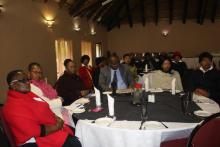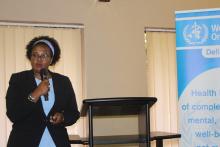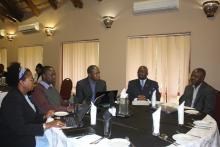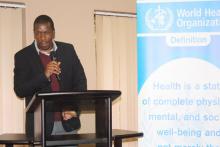Swaziland conducts Post MR and IPV vaccine Introduction Evaluation
The Inactivated Polio Vaccine (IPV) and Measles Rubella (MR) vaccine which were introduced by the government of Swaziland in 2016, have been well received by the people of Swaziland.
This is contained in a report presented by the Post Introduction Evaluation of the Inactivated Polio Virus (IPV) and Measles and Rubella (MR) vaccines team during a debriefing meeting to the Ministry of Health held recently at Sibane Hotel in Ezulwini. The MR vaccine and IPV were both introduced in July 2016 after the MR Catch-up Campaign which started on 26 June 2017. The Post Introduction Evaluation exercise was technically and financially supported by the World Health Organisation (WHO) and UNICEF. A local team was put together to work on this exercise supported by technical experts from WHO Kenya, Tanzania and the Inter-country Support Team (IST).
The objectives of this exercise were to assess the overall impact of introduction of the IPV and MR vaccines on the immunization programme, identify the Expanded Programme on Immunisation (EPI) areas impacted by introduction of IPV and MR, provide recommendations for corrective action and also document good practices and lessons learnt to inform future new vaccine introduction. The team visited about 12 health facilities (three in each region), as well as the National Expanded Programme on Immunization (EPI) offices, Central Vaccine Store ( CVS)and the Central Medical Stores(CMS).
The evaluation revealed that the introduction of the IPV and MR vaccines was nationwide. All the necessary processes for vaccine introduction were followed including the development of a national introduction plan, training of health workers as well as dissemination of information educational and communication materials in both English and SiSwati for community engagement and social mobilisation. The knowledge of the diseases prevented by the IPV and MR vaccines, and skills among health workers, especially in Manzini, Lubombo and Hhohho were found to be high.
Another important finding was that vaccination coverage was calculated and immunisation monitoring charts completed monthly at national level with clear documentation and storage of coverage documents and reports as from 2009. Underperforming regions were prioritised and supported with resources for improving immunisation coverage. Further, an Adverse Event Following Immunisation (AEFI) Review Committee was established and trained on causality assessment. Guidelines and reporting forms for AEFI were available at national level and in some health facilities.
On the other hand, the evaluation team found that immunisation coverage at national level was persistently below the WHO recommended 80%. Some of the challenges noted were that there were delays in the delivery of vaccines by suppliers which led to stock-outs and low stocks of vaccines. Shortage of qualified human resources especially in the laboratory was also noted. Disposal of expired vaccines was also problematic as Yellow Fever vaccine which expired in Nov 2016 was still kept at CVS. Waste disposal sites were not locked or fenced off in some health facilities in Lubombo and Shiselweni Regions.
As part of the recommendations it was suggested that the Ministry of Health should review the situation of vaccines and find solutions to ensure that stock outs of vaccines are not experienced. Vaccine forecasting and rolling out of vaccine wastage monitoring at all levels was needed as well as the development of a comprehensive vaccination manual to incorporate all existing vaccines.
In terms of future vaccines, the team recommended that the Ministry of Health should support regions and health facilities to prepare new vaccine introduction plans to guide implementation of activities. Refresher training and practical demonstrations for health facility staff are also needed. The team also suggested that the Ministry of Health should explore feasibility of providing backup generators at sub-national levels, facilitate repairs of malfunctioning vaccine fridges and regular maintenance of such equipment at sub-national levels, reinforce temperature recording in regions and health facilities where this is not being done and also introduce the use of freeze/fridge tags during vaccine transportation.
Speaking during the debriefing meeting the Senior Medical Officer in the Ministry of Health in charge of public health, Dr Michael Lukhele stressed that immunisation saves millions of lives and is recognised as the world’s most successful and cost effective health intervention. Dr Lukhele said immunisation plays a big role in achieving the 2030 Sustainable Development Goals. He further reiterated the Ministry of Health’s commitment to improving human resource issues which remain a challenge for the EPI.







